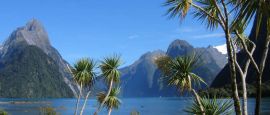New Zealand: Doing business & staying in touch
Doing business in New Zealand
Business attire is generally conservative; suits are usually worn but jackets may soon be discarded and shirtsleeves rolled up. A more informal dress code also exists in most restaurants and bars, although the smartest restaurants may still prefer a jacket and tie.
Conducting business in New Zealand is the same as most other Western countries; appointments are necessary and punctuality is appreciated. Business cards are exchanged. The business approach is fairly conservative and visitors should avoid the period from Christmas to the end of January. The best months for business visits are February to April and October to November. Business hours are generally Monday to Friday, 0900 to 1700.
There are no cultural pitfalls to watch out for, unless dealing directly with Maori (who will outline any protocols before meetings), and the only noticeable difference lies with the nature of the country's people. New Zealanders are notably friendlier, more informal and more relaxed than most other Western nations.
Dinner is seen as a time for socialising and not business, so meetings mainly take place over lunch. Invitations to dine out or to visit someone's home are far more readily issued than in many other countries, and are genuine. The native host will expect to pay for a meal or a round of drinks but guests can step in and pay their turn without creating arguments or offence.
New Zealand is primarily thought of as an agricultural country and, although the sector employs less than 7% of the workforce and contributes just 5% of GDP, it accounts for 30% of the country's export income, primarily from wool, meat, dairy and wood products. Energy-related natural resources, principally coal but also natural gas, have been heavily developed. There are also deposits of iron, gold and silica.
Between the mid-1980s and mid-1990s, New Zealand underwent one of the most radical economic transformations of any Western industrialised country, with wholesale privatisation, abolition of subsidies, tariff barriers and corporate regulations, and dismantling of many welfare systems (although spending has risen sharply to tackle the pensions crisis afflicting the developed world). The reforms have also led to New Zealand being more dependent on foreign trade.
Like the global economy, New Zealand slipped into a recession in 2008, amid drought, high energy costs and a housing market slump. The economy pulled out of recession late in 2009, however, and achieved 1.7% growth in 2010 and 2% in 2011. Despite this growth, trade sectors remain delicately poised.
Australia is New Zealand's largest trading partner, and the two governments have established a completely free trading regime. New Zealand is a member of the Organisation for Economic Co-operation and Development (OECD), the South Pacific Forum, the Pacific Islands Forum and the Asian-Pacific Economic Co-operation (APEC) forum.
The largest conference centres are in Auckland, Christchurch and Wellington. Many hotels also have facilities. There are more than 20 regional convention bureaux in New Zealand, most of which are members of Conventions and Incentives New Zealand.
Machinery and equipment, vehicles and aircraft, petroleum, electronics, textiles and plastics.
Keeping in Touch in New Zealand
Most public phones take cards purchased from bookstalls; some also accept credit cards, but very few still accept coins.
Roaming agreements exist with most international mobile phone companies. Coverage is good.
There are internet cafés in cities and town central business districts. Travellers can access the internet at many hotels and youth hostels.
New Zealand's media scene is very liberal and the broadcasting sector was deregulated in 1988. Television stations include the state-owned Television New Zealand (Channels One, Two, Six and Seven), the private TV3 and Prime TV, and the public Maori Television. Radio broadcasters include Radio New Zealand, the Pacific Island-focused Niu FM, and the Maori-language Ruia Mai.
The English-language daily newspapers with the highest circulation include the New Zealand Herald, The Dominion Post, Otago Daily Times and The Press. For current affairs, look out for a copy of North and South. Other quality periodicals include New Zealand Geographic, New Zealand Wilderness and New Zealand Outside.








 You know where
You know where